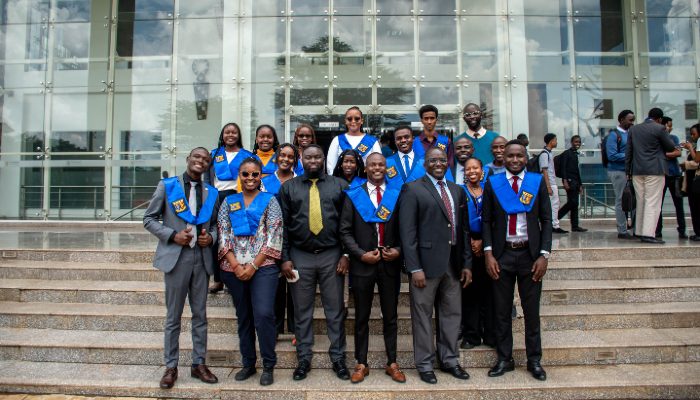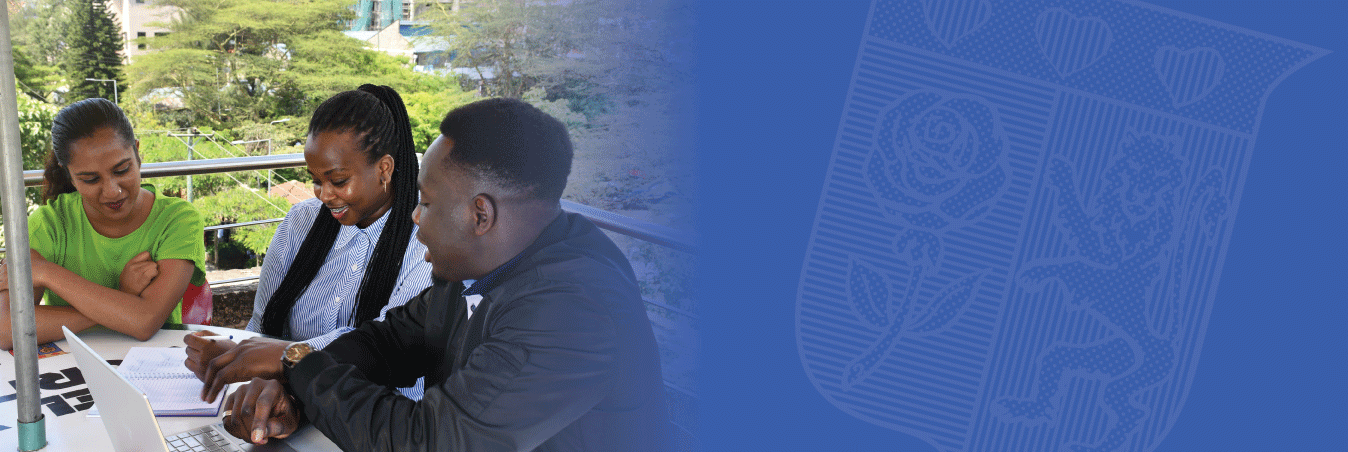Stella Musyoka, Faculty Administrator at the Office of Faculty Affairs, is a mother who, through her experience, has encountered the intricate world of raising children with neurodivergent conditions. She shares her journey of raising her 18-year-old daughter, Mary*, who in her earlier years, was diagnosed with Dyscalculia, a neurodivergent condition that affects her ability to understand and manipulate numbers.
This story promises to be a powerful narrative that sheds light on the challenges and triumphs of navigating the healthcare and education systems in Kenya. Here’s an account of her experience, from discovery of the condition to learning how to support her daughter through the unique challenges encountered in both the medical rehabilitation and education system.
Early Discoveries:
“I noticed early signs of Mary’s struggles with mathematics during her primary school years. Despite putting in extra hours, Mary found it increasingly difficult to grasp numerical concepts, leading to frustration and anxiety.” Concerned about her daughter’s well-being, Stella took the initiative to embarked on a journey to seek medical and educational support.
Medical Rehabilitation Challenges:
The first challenge Stella encountered was the limited awareness and understanding of dyscalculia within the medical community in Kenya. Many healthcare professionals were unfamiliar with the condition, complicating accurate diagnosis.
At school, my daughter would narrate her difficult experience in some of her classes as it was hard for her to grasp some of the concepts, and her classmates would ridicule and laugh, whenever she requested for a better explanation: a case in point difference between square and square root. In turn, affecting her academic growth.”
Stella had to advocate persistently for a comprehensive evaluation for Mary, involving numerous visits to the Education Assessors and Mental Occupational Therapists. “It was an occupational therapist at Kenyatta National Hospital (KNH), named Binti, who finally diagnosed Mary’s condition.” This vital moment underscored the importance of knowledgeable professionals in identifying and addressing neurodivergent conditions like dyscalculia.
“Getting diagnosed is just the beginning of the journey. Getting access to specialized therapies, such as cognitive behavioral therapy and occupational therapy, posed another hurdle.”
Stella shares her efforts to connect with rehabilitation centers and therapists experienced in dyscalculia, highlighting the importance of building a network of support within the neurodiversity community.
Education Support Struggles:
Stella’s journey also led her to confront the gaps in the education system. She recounts the challenges of advocating for appropriate accommodations and specialized teaching methods tailored to Mary’s needs. The lack of awareness among educators and the need for inclusive practices in mainstream schools became prominent themes in Stella’s narrative.
In an interview, Stella revealed Mary’s struggle with realizing her limitations amidst the harshness and ridicule from classmates when seeking clarification on mathematical concepts. For instance, the differentiation between square and square root often left her feeling isolated. In addressing the question of school selection, Stella emphasized that it wasn’t about finding a specific institution but rather accommodating teachers, as specific learning disabilities like dyscalculia are often overlooked at the policy level. She shared her decision to enroll Mary in a school offering Accredited Christian Education (A.C.E), noting its self-paced structure. However, Stella pointed out that even with its Math syllabus, a significant amount of customized and personalized teaching was necessary. Despite these challenges, Stella emphasized Mary’s resilience in embracing her neurodiversity and openly discussing it in safe spaces.
Despite facing setbacks, Stella emphasizes the importance of perseverance and collaboration. She shares success stories of educators who embraced professional development to better support neurodivergent students, as well as instances where Mary thrived in environments that celebrated neurodiversity. In reflecting on the impact of Mary’s diagnosis and management, Stella noted a significant improvement in her daughter’s well-being. Mary experienced reduced social anxiety, attributed to Stella’s heightened awareness of potential triggers for sensory overload. Stella’s proactive approach has contributed to Mary’s increased happiness and stability, contrasting with her previous episodes of anxiety and depression. This transformation underscores the importance of early diagnosis and effective management strategies in enhancing the quality of life for neurodivergent individuals and their families.
Empowering the Community:
Stella’s story is not just one of struggles; it’s a testament to the power of community advocacy. She discusses her involvement in local support groups and initiatives aimed at raising awareness about dyscalculia and neurodiversity in general. Stella became a voice for parents facing similar challenges, encouraging them to navigate the system with resilience and determination.
Looking to the Future:
As Mary approaches adulthood, Stella reflects on the progress they’ve made and the work that lies ahead. She envisions a future where neurodivergent individuals like ‘’Mary’’ have equal opportunities in education and employment, and she continues to champion for policy changes and societal shifts in perception. Stella’s optimism for Mary’s future is grounded in tangible improvements observed since her daughter’s diagnosis and management. Mary’s reduced social anxiety, stemming from Stella’s increased awareness of potential triggers for sensory overload, has led to a notable transformation. This positive evolution reinforces Stella’s commitment to advocating for a more inclusive society where neurodivergent individuals can thrive and contribute fully. Stella further expresses confidence in Mary’s ability to navigate adulthood, noting that it will be easier now that Mary is aware of her full support and has accepted her limitations. This acceptance, coupled with Stella’s unwavering advocacy, provides a strong foundation for Mary as she embarks on her journey into adulthood.
Stella Musyoka’s journey is a poignant narrative of a mother’s love, resilience, and advocacy for her neurodivergent daughter. It serves as an inspiration for parents, educators, and healthcare professionals to work collaboratively towards creating a more inclusive and supportive environment for individuals with dyscalculia and other neurodivergent conditions in Kenya.
*Mary – not her real name.
Article written by Wambui Gachari
What’s your story? We’d like to hear it. Contact us via communications@strathmore.edu
ALSO CHECK OUT
See more news-

Gen Francis Ogolla: How power of humility delivers transformative leadership* 25,Apr,2024
As the country mourns the Chief of Defence Forces of Kenya, General
-

Highlights from the SBS Undergraduate Fourth Years’ Gala Dinner* 25,Apr,2024
Friday, 8th March 2024 was an evening of celebration as students from the
-

Celebrating Humanities and Social Sciences 2024 graduates.* 25,Apr,2024
On Friday evening, April 19th 2024, Strathmore University held a celebratory gala
-

Elevating Tourism & Hospitality Leadership: Transformative trends shaping the future of the industry* 23,Apr,2024
On April 18, 2024, the Strathmore University School of Tourism and Hospitality
-

Towards Climate Resilience: Strathmore University, Imperial College Partnership* 23,Apr,2024
In a bid to foster joint efforts in tackling climate resilience issues,
-

Crossing Continents: Yvette Yego’s Transformative Journey through the Sciences Po Exchange Program* 22,Apr,2024
“I’ve gained extensive knowledge in international studies, interacted with diverse students from
-

Stratizens Explore Malaysian Cinema: Mechamato Screening at Sarit Center* 22,Apr,2024
Imagine being invited by the Malaysian embassy in Kenya to an exclusive
-

Strathmore Hosts the 2nd Mediation Summit on Employment Disputes* 19,Apr,2024
In a world where the dynamics of employment relations shape the very
-

Strathmore Tax Hackathon 2024: Cultivating Innovation in Tax Policy* 19,Apr,2024
In the heart of Nairobi, the prestigious Strathmore Law School hosted the
-

Transforming Mental Health Support for Students at Strathmore* 17,Apr,2024
In Kenya, within the bustling academic environment of universities, there exists a

